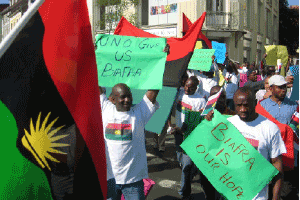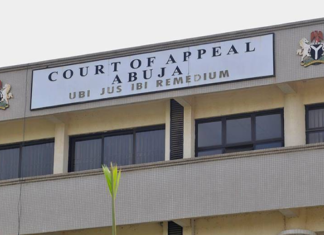Special Correspondent, CHIBUZOR NWACHUKWU, writes on the crisis in leadership of MASSOB and how it would work against the agenda of the organisation
Attendance at the Biafra Heroes Day in Owerri, Imo State capital, late last may, was unprecedented. The Movement for the Actualisation of the Sovereign State of Biafra (MASSOB) had slated the day to rekindle the spirit of the struggle to actualise the Biafra Republic.
MASSOB members
Leader of MASSOB, Ralph Uwazuruike, was in his elements in reiterating his dream and vision of emancipating the Igbo of the South East geopolitical zone from the present Nigerian state.
At the occasion, Uwazuruike made case for division of Nigeria into six zones, insisting that one of these zones, the South East, would ultimately become the Republic of Biafra.
He further contended that there is no going back on the struggle for Biafra’s independence, adding that the age-long marginalisation and bad politics against Ndigbo would become a thing of history in no distant time.
Uwazuruike’s submission elicited huge ululation from those present whose support for the struggle has remained unyielding since he started the movement some years ago.
Incidentally, when Uwazuruike gave indications of embarking on the MASSOB struggle, Nigerians and the then federal government dismissed it with a wave of the hand.
It, however, took the first sit-at-home directive to the Igbo by the organisation in 2003 for the Nigerian authorities to realise that the MASSOB activists were not mere jokers that they had been thought to be. In apparent bid to save face, the then President Olusegun Obasanjo, who was caught napping at the thoroughness of the Uwazuruike directive, attempted to reduce it to a mere mass return of Ndigbo for the annual new yam festival. But this did not deter the MASSOB struggle, as several rallies, meetings and protest matches have been held ever since.
In going about the initiative, Uwazuruike, the arrowhead of the struggle, had always been a constant visitor to most prisons in Nigeria. His incarceration had also won him the sympathy of Nigerians and had thrown him up as quintessential human rights activist.
Soon, he projected his name and image of his organisation, sharing podium in human rights activism with the likes of Fredrick Fasehun of Oodua Peoples Congress (OPC), Mujaheed Asari Dokubo of the Niger Delta Peoples Volunteer Force (NDPVF), among others.
Of late, however, questions are being asked by observers over the turn of events in MASSOB as well as Uwazuruike’s political disposition.
The apprehension began to take shape when he got MASSOB enmeshed in the politics of the All Progressives Grand Alliance (APGA), apparently in a bid to demonstrate support for the late Dim Chukwuemeka Odumegwu Ojukwu, the undisputed Igbo leader. MASSOB, thus, began to assume the militant organ of the party and also found itself involved in partisan politics.
Uwazuruike was, for instance, alleged to have brought Rochas Okorocha to the late Ojukwu as Imo governorship candidate of the party against the then governor and Peoples Democratic Party (PDP), Ikedi Ohakim.
He later made a volte face when Ohakim visited his Okwe country home in Onuimo Local Government Area and tarred the major road leading to his house.
On account of this development, the activist fell out with Okorocha, who felt betrayed by his romance with Ohakim. Ever since, the two have been in cold war of sorts.
Somehow, the death of Ojukwu was the last major outing of Uwazuruike and his MASSOB members. The next appearance was at the Biafra Heroes Day. Curiously, less than a week after Uwazuruike announced that there was no going back on the Biafra struggle for independence, he declared his support for President Goodluck Jonathan’s re-election.
In apparent bid to drive home his point, he suspended the MASSOB Director of Information, Uchenna Madu, over his statement that the president should forget his 2015 ambition, if the strike by the academic staff of the Federal Polytechnics and Colleges of Education is allowed to continue.
Uwazuruike claimed that Madu was on his own when he made those statements, stressing that MASSOB was in support of Jonathan’s second term.
“Uchenna Madu is on his own; he did not clear from us before granting that interview. The story is not the position of MASSOB and we are not part of it.
“We, the members of MASSOB, are solidly in support of President Goodluck Jonathan’s 2015 second term ambition. These strikes and incidences on insecurity in Nigeria are targeted at scuttling the victory of Mr. President in 2015,” he said.
Though Madu, in a show of loyalty, accepted the suspension, the unfolding development appears to be threatening the foundation of MASSOB as a body, many have noted. For example, most members are alleged to be reconsidering their stand on the struggle, as, according to them, their leader has sold out in betraying the spirit and essence of the movement.
The confusion, it was learnt, may have led to the activities of some of the members in Onitsha Main Market who, it is alleged, extort money from traders and buyers in the area. The victims, it is alleged, are compelled to pay taxes and levies for their purchases, failure of which they would be manhandled and their goods confiscated.
The face-off between Madu and Uwazuruike is currently creating a divide in the movement, as some are contending that the suspended Information Director did nothing wrong.
According to Madu, “I never said that Jonathan should forget 2015 general election. All I said was that our youths are getting frustrated due to the long stay at home. This should not create problem in MASSOB.
“All the same, I accept my suspension by my leader, Uwazuruike; but if there is any deal between the president and MASSOB, we are not aware because MASSOB members so much believe in Biafra and not Nigeria.
“It would amount to hypocrisy for us to be speaking from both sides of the mouth. If it is Biafra that we want, let us forget about Nigeria and everything that concerns her; but if it is Goodluck Jonathan, let us drop Biafra and focus on his presidential ambition.”
Analysts argue that on account of the ugly development, the fate of MASSOB appears to be hanging on a balance.
The question many have been asking is, what becomes of MASSOB and its struggle for a separate country from Nigeria, in the event of Jonathan winning a second term?













